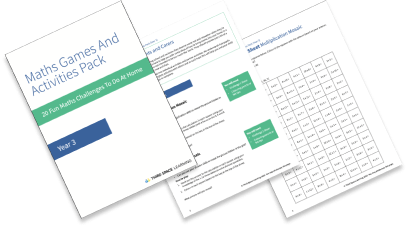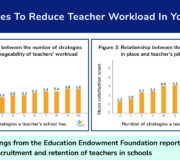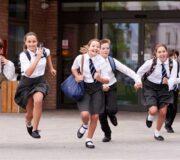The Great British Homework Debate 2024 – Is It Necessary At Primary School?
The homework debate is never much out of the news. Should homework be banned? Is homework at primary school a waste of time? Do our children get too much homework?
Not long ago, UK-based US comedian Rob Delaney set the world alight with a tweet giving his own personal view of homework at primary school. We thought, as an organisation that provides maths homework support on a weekly basis, it was time to look at the facts around the homework debate in primary schools as well as, of course, reflecting the views of celebrities and those perhaps more qualified to offer an opinion!
Here’s how Rob Delaney kicked things off

Gary Lineker leant his support with the following soundbite:
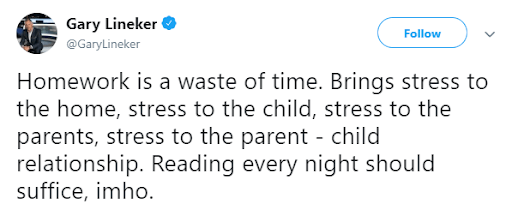
And even Piers Morgan weighed in, with his usual balance of tact and sensitivity:
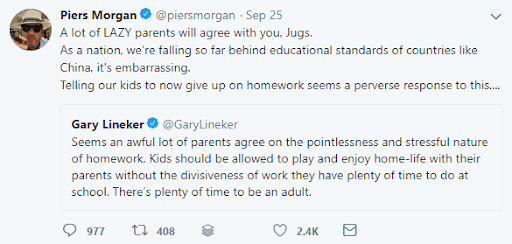
A very experienced and knowledgeable Headteacher, Simon Smith, who has a well-earned following on Twitter (for someone working in education, not hosting Match of the Day) also put his neck on the line and, some might think controversially, agreed with the golden-heeled Crisp King of Leicester…
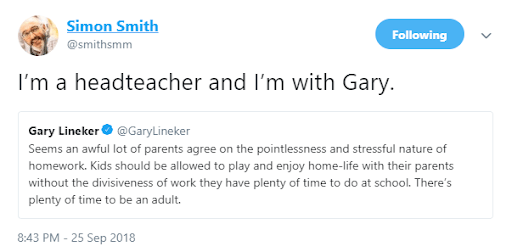
Fortunately Katharine Birbalsingh, Conservative Party Conference keynote speaker and Founding Headteacher of the Michaela School, was on hand to provide the alternative view on the importance of homework. Her op-ed piece in the Sun gave plenty of reasons why homework should not be banned.
She was informative and firm in her article stating: “Homework is essential for a child’s education because revisiting the day’s learning is what helps to make it stick.”
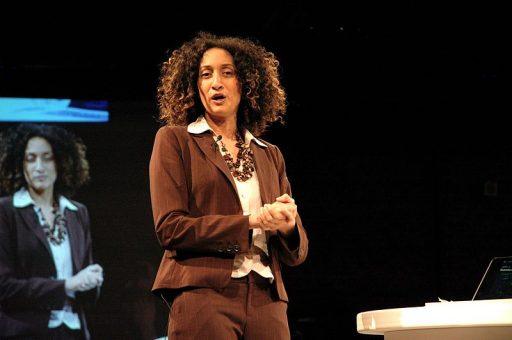
KS2 Maths Games and Activities Pack
A FREE downloadable games and activity pack, including 20 home learning maths activities for KS2 children to complete on their own or with a partner.
Download Free Now!How much homework do UK primary school children get?
Sadly, there’s little data comparing how much homework primary school-aged children in the UK and across the globe complete on a weekly basis. A study of teenagers used by The Telegraph shows that American high-schoolers spend an average of 6.1 hours per week compared with 4.9 hours per week of homework each week for UK-based teens.
Up until 2012, the Department of Education recommended an hour of homework a week for primary school Key Stage 1 children (aged 4 to 7) and half an hour a day for primary school Key Stage 2 children (aged 7-11). Many primary schools still use this as a guideline.
Teachers, parents and children in many schools across the land have seen more changes of homework policy than numbers of terms in some school years.
A ‘no-homework’ policy pleases only a few; a grid of creative tasks crowd-sourced from the three teachers bothered to give their input infuriates many (parents, teachers and children alike). For some parents, no matter how much homework is set, it’s never enough; for others, even asking them to fill in their child’s reading record once a week can be a struggle due to a busy working life.
Homework is very different around the world
We’d suggest that Piers Morgan’s argument for homework in comparing the UK’s economic and social progress with China’s in recent years based on total weekly homework hours is somewhat misguided – we can’t put their emergence as the world’s (if not already, soon to be) leading superpower exclusively down to having their young people endure almost triple the number of hours spent completing homework as their Western counterparts.
Nonetheless, there’s certainly a finer balance to strike between the 14 hours a week suffered by Shanghainese school-attendees and none whatsoever. Certainly parents in the UK spend less time each week helping their children than parents in emerging economies such as India, Vietnam and Colombia (Source: Varkey Foundation Report).
Disadvantages of homework at primary school
Delaney, whose son attends a London state primary school, has made it plain that he thinks his kids get given too much homework and he’d rather have them following more active or creative pursuits: drawing or playing football. A father of four sons and a retired professional footballer Gary Linaker was quick to defend this but he also has the resources to send his children to top boarding schools which generally provide very structured homework or ‘prep’ routines.
As parents Rob and Gary are not alone. According to the 2018 Ofsted annual report on Parents Views more than a third of parents do not think homework in primary school is helpful to their children. They cite the battles and arguments it causes not to mention the specific challenges it presents to families with SEND children many of whom report serious damage to health and self-esteem as a result of too much or inappropriate homework.
It’s a truism among teachers that some types of homework tells you very little about what the child can achieve and much more about a parent’s own approach to the work. How low does your heart sink when your child comes back with a D & T project to create Stonehenge and you realise it’s either an all-nighter with glue, cardboard and crayons for you, or an uncompleted homework project for your child!

Speaking with our teacher hats on, we can tell you that homework is often cited in academic studies looking at academic progress in primary school-aged children as showing minimal to no impact.
Back on Twitter, a fellow teacher was able to weigh-in with that point:

Benefits of homework at primary school
So what are the benefits of homework at primary school? According to the Education Endowment Foundation (EEF) (the key research organisations dedicated to breaking the link between family income and educational achievement) the impact of homework at primary is low, but it also doesn’t cost much.
They put it at a “+2 months” impact against a control of doing nothing. To put this into context, 1-to-1 tuition is generally seen as a +5 months impact but it’s usually considered to be expensive.
“There is some evidence that when homework is used as a short and focused intervention it can be effective in improving students’ attainment … overall the general benefits are likely to be modest if homework is more routinely set.”
Key to the benefit you’ll see from homework is that the task is appropriate and of good quality. The quantity of homework a pupil does is not so important. In this matter Katharine Birbalsingh is on the money. Short focused tasks which relate directly to what is being taught, and which are built upon in school, are likely to be more effective than regular daily homework.
In our view it’s about consolidation. So focusing on a few times tables that you find tricky or working through questions similar to what you’ve done in class that day or week often can be beneficial. 2 hours of worksheets on a Saturday when your child could be outside having fun and making friends probably isn’t. If you really want them to be doing maths, then do some outdoor maths with them instead of homework !
At Third Space Learning we believe it’s all about balance. Give the right sort of homework and the right amount at primary school and there will be improvements, but much of it comes down to parental engagement.
One of our favourite ways to practise maths at home without it become too onerous is by using educational games. Here are our favourite fun maths games, some brilliant KS2 maths games, KS1 maths games and KS3 maths games for all maths topics and then a set of 35 times tables games which are ideal for interspersing with your regular times tables practice. And best of all, most of them require no more equipment than a pen and paper or perhaps a pack of cards.
Homework and parents
One of the key benefits cited by EEF is in regard to parental engagement. Time after time, the greatest differentiator between children who make great progress at school – and those, frankly – who don’t is due to the same factor in the same studies: parental engagement.
It is a fair assumption that if a parent is engaged in their child’s learning, they’re probably going to be the same parents who encourage and support their child when they’re completing their homework.
Whereas parents who are disengaged with their child’s school and schooling – for whatever reason (sorry, Piers, it’s rarely due to laziness), are highly unlikely to be aware of what homework gets set each week, let alone to be mucking in with making sure it gets handed in completed and on time.
We also encounter time and again, the issue of parents’ own lack of confidence in maths. A survey by Pearson found that:
- 30 percent of parents “don’t feel confident enough in their own maths skills to help their children with their primary school maths homework”
- 53 per cent insisted they struggled to understand the new maths teaching methods used in modern classrooms. Fortunately that’s what we’re here to address.
Setting the right homework at primary school can be tricky
Although we disagree with Piers, we can see what he may be driving at in terms of setting appropriate homework.
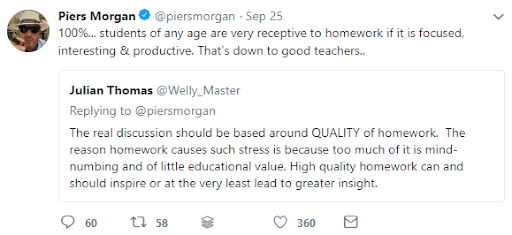
The question quickly becomes what would Piers think of as being ‘interesting’ homework, and if all four of his children would agree upon the same thing being ‘interesting’.
That’s the problem.
One would imagine Piers would find it hard enough finding one task to satisfy the interest of all of his four children – it’s almost impossible to find a task that will engage the interest of 30 or more children in their out of school hours.
Each with different emotional, behavioural and learning needs, then sprinkle in the varying levels of poverty each family suffers (be it financial or in terms of time), and you can see how it isn’t just about being a good or bad teacher – whatever that means – in regards to being able to set Morgan-approved homework tasks.
What does this mean for my child?
Ultimately, the question at the top of mind whenever a parent thinks about homework is a more general one – am I doing the best for my child?
Although the world is changing at a faster pace than ever before in human history, what’s best for children hasn’t changed that much (if at all).
One-to-one support is best, and young people benefit most from adult-child conversations where they acquire new vocabulary and language structures to form and share their thoughts and opinions.
These insights – that one-to-one support is best and that regular, structured adult-child conversations are life-changing within a child’s development – are what inspired us to create Third Space Learning.
A platform where children can engage with a community of specialist tutors in a safe, structured learning environment where they are able to engage in one-to-one conversations that enable them to progress in their learning with confidence.
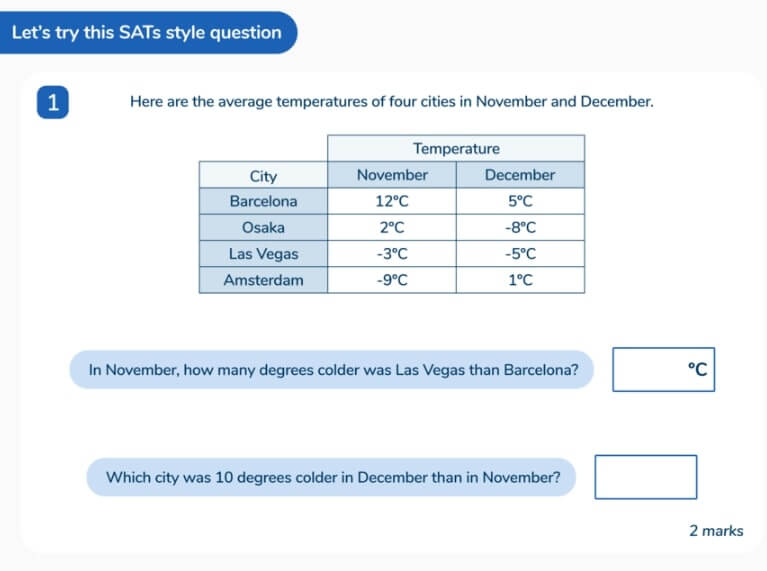
Read more
DO YOU HAVE STUDENTS WHO NEED MORE SUPPORT IN MATHS?
Every week Third Space Learning’s maths specialist tutors support thousands of students across hundreds of schools with weekly one to one tuition designed to plug gaps and boost progress.
Since 2013 these personalised one to one lessons have helped over 150,000 primary and secondary students become more confident, able mathematicians.
Learn about our experience with schools or request a personalised quote for your school to speak to us about your school’s needs and how we can help.

